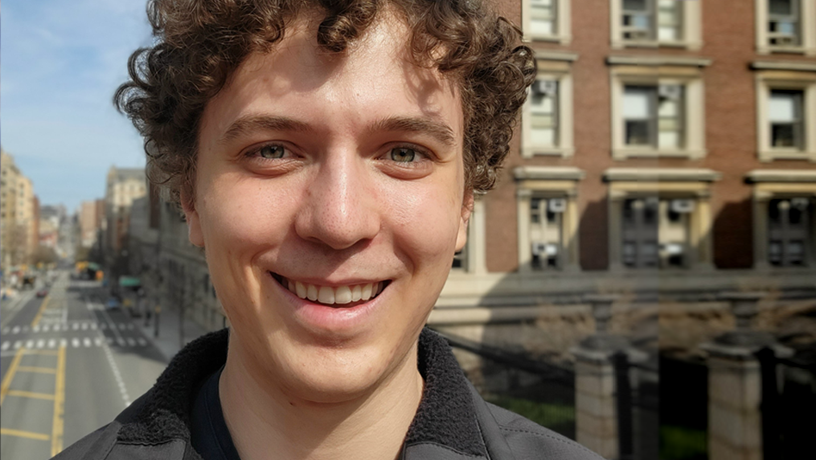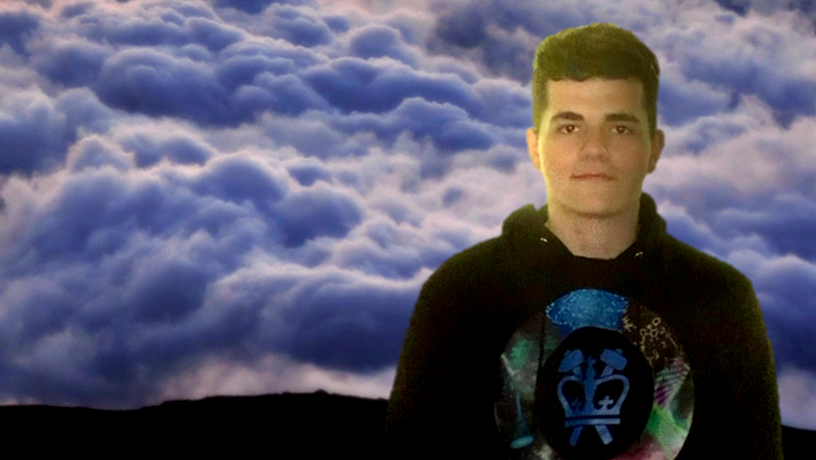Meet Columbia Engineering’s 2021 Valedictorian and Salutatorian
Noah Huber-Feely and Alex Paskov, valedictorian and salutatorian of Columbia Engineering’s undergraduate class of 2021, have earned the School’s highest academic honors. As valedictorian, Huber-Feely will be awarded the Illig Medal and speak at Engineering Class Day on April 29. We caught up with the accomplished seniors to see where they’re coming from, what they’ve learned at Columbia, and what’s next.

Noah Huber-Feely, Valedictorian
Major: Computer Science
Hometown: A farm just outside Winchester, Tennessee
Why Columbia Engineering? Where else can one go deep into graduate-level machine learning coursework while also taking in-depth humanities courses on the implications of AI? I had a less traditional background: homeschooled through high school, lived and worked on the family farm, launched a small startup, and helped lead an entrepreneurship conference. Columbia's interdisciplinary focus and direct ties to the professional world were a perfect fit for this background, and integrating into the big city was surprisingly smooth.
Why Computer Science? From the moment I developed my first program I was excited by how CS enables quickly building useful things by just typing on a keyboard. My interests have since taken me to the frontiers of machine learning and robotics. The diversity of backgrounds both in New York and at Columbia broadened my perspective not only on technical problems but greater societal concerns, and I think this is the best place to develop that contextual understanding.
Favorite course? It’s impossible to pick just one, but I'd have to mention Unsupervised Machine Learning with lecturer Nakul Verma, which delved into the mathematical theory supporting various methods, looking deeply into the fundamental mathematics underlying certain algorithms. The course ended with a final project to utilize this mathematical beauty to develop a novel machine learning approach which, in my case, was a system for generating classical music. Plus, Contemporary Civilization with Charles McNamara of the Department of Classics was really impactful to my intellectual development, and I still routinely consider the ideas and thinkers that were covered.
Most meaningful project/assignment? Developing a smartphone-based automatic fall detection system for the elderly. The course in Applied Statistical Methods encouraged open-ended final projects, so I combined my software development, statistical analysis, machine learning, and signal processing skills. Such a system might have helped my grandmother, and the project connected the theory I’d learned to an actual system that could save lives. Theory for the sake of itself is fine, but all the better when applied to meaningful problems.
The most important thing Columbia Engineering has taught you? Having a wide range of cross-disciplinary skills and knowledge. Engineering is in many ways a creative discipline, and a solution can often be best found by connecting ideas across fields.
How Columbia Engineering prepared you for your career? My courses and professors helped shift my career focus from general software development to the highly technical areas of robotics and data science, advanced fields I hadn't previously imagined I'd be able to start a career in. Being able to cover a wide range of areas and subfields both in my classes and in my internships has been very useful for identifying the career path I want to pursue. Also, the friends and classmates I’ve gotten to know, each with varied and far-reaching interests, have helped me refine my perspective and continually inspired me to dream big.
What engineering for humanity means to you? Developing a critical awareness of the social and environmental problems that engineering can help address—and equally importantly being aware of when engineering can harm. Today, engineers in all industries have a key role addressing climate change and developing solutions across all fields.
The most inspirational people in your life? My parents, though not in technological fields, have always had an entrepreneurial spirit and were driven to do things in life they were passionate about rather than for monetary reasons. This mindset has certainly inspired me a lot. My siblings and cousins have also pursued a great diversity of fields, and, as someone with a lot of interests, I have always been inspired by all their pursuits.
Your hobbies? Long-distance running—I've absolutely loved exploring NYC on foot out to Queens, the Bronx, and elsewhere around the city. It’s been an invaluable reprieve from the pressures of academic life, and I've managed to explore most of Manhattan and even as far as Rockaway Beach. I’m also part of the Quantified Self movement collecting a bunch of personal data like heart rate, sleep, and stress levels to analyze to optimize one’s life. It’s turned out to be a fun way to apply the things I've been learning in statistics and machine learning in an interesting extracurricular way.
Plans for after graduation? I'll be working on autonomous tractors at Bear Flag Robotics in California's Bay Area. Growing up on a small farm, one of my interests has been how we can reduce the environmental impact of commercial agriculture while improving food security in the face of a changing climate. It is thus fitting that I will be able to use my computer science and machine learning skills to increase the sustainability of commercial agriculture. I plan for my longer-term career path to follow in this same vein helping enable equitable applications of machine learning to address the important problems facing humanity.

Alex Paskov, Salutatorian
Major: Applied Math
Hometown: Scarsdale, New York
Why Columbia Engineering? Initially, what drew me to Columbia was the fact that it’s a world-class educational and research institution embedded within the most vibrant city in the world. But after attending the Days on Campus orientation, I realized that what truly made Columbia unique was the incredible density of hyper-talented people on campus. Almost every situation, whether it’s grabbing a cup of coffee, going to class or doing something as mundane as laundry, has been an opportunity to have an amazing conversation, many of which I still think about years later. And it’s from among this set of people that I’ve had the privilege of making incredible lifelong friends.
Favorite Course? While it’s very difficult to choose just one, if I had to pick, I would say Analysis of Algorithms with ProfessorDaniel Bienstock, because it strikes a rare balance between interesting and challenging mathematics, while simultaneously remaining incredibly relevant for the real world.
Most meaningful project/assignment? One of the most meaningful projects was the “Prime Number Project” in my Discrete Mathematics class with Professor Ansaf Salleb-Aouissi. There, we were tasked with learning about various computer-algorithms for factoring and classifying prime numbers. I specifically remember being unsatisfied with how slowly my program ran, but after deriving some clever mathematical and algorithmic ideas, my program’s runtime reduced from over 100 seconds to mere microseconds — a 100 million-fold speed-up. Ultimately, this impressed my professor and made me realize, viscerally, just how much potential there is in applying clever mathematics to computer science.
How Columbia Engineering prepared you for your career? The Engineering Core, which pushes us to take classes in similar areas to our major, has definitely had the biggest positive impact on my research internships and classes. Specifically, when starting my internships, I always surprised my mentors with my strong knowledge of programming, optimization theory, and machine learning, as they had only expected me to be strong at math. Last summer, for instance, I surprised my mentor with my knowledge of reinforcement learning and distributed computing systems, both of which ended up being critical for the success of our Poker AI project.
What engineering for humanity means to you? A few weeks ago OpenAI, an AI company founded by Elon Musk, predicted that within the next decade “artificial intelligence will generate enough wealth to pay each adult $13,500 a year.” If this holds true, humans will have immensely more freedom to pursue their interests, whether in STEM or the humanities, and have significantly greater access to better healthcare. To me, that’s exactly what Engineering for Humanity means — using science and technology to improve the human condition and expand the set of opportunities each person has.
The most inspirational people in your life? My entire family, because they have always encouraged my scientific curiosity. Whether it was introducing me to programming in the third grade, helping me build custom computers, or launching model rockets equipped with LEDs to turn the nighttime sky into our own canvas, my family has shown me how exciting science is. And by building a life in America from scratch after immigrating as PhD students from poverty-stricken communist Bulgaria, my parents in particular have shown me the importance of hard work in succeeding in both science and in life.
Plans for after graduation? I'll be heading to MIT to pursue a PhD in optimization, machine learning, and statistics with MIT Professor Dimitris Bertsimas. My Columbia education has provided me with an incredible background, which I am now excited to leverage to tackle important and meaningful real-world problems.
